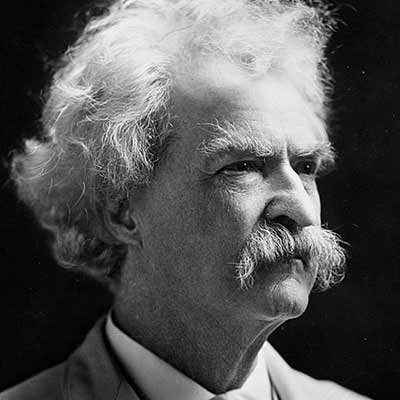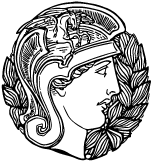In the 1860s Samuel Clemens invented the literary persona and stage-name “Mark Twain,” and became America’s most famous humorist and satirist—and perhaps the most famous American in the world by the time of his death in 1910. Today, we think of Twain as the author of the classic (and controversial) Adventures of Huckleberry Finn; in his own day, he was known as both an author and comic performer. How did Twain bring Western humor traditions and vernacular language to lecture tours, stories, and novels to millions of people across the globe? Twain’s satirical humor deflated pretensions, violated Victorian cultural norms, and took on serious political issues such as slavery and U.S. imperialism. Historian Philip Gould explores some of the main thematic and psychological dimensions of Twain’s humor, which probed what he saw as the darker side of human nature.
EX LIBRIS: The Mark Twain House & Museum
Mark Twain—writer, raconteur, provocateur, and social critic—was also Samuel Langhorne Clemens—son, father, brother, friend, and employer. With a focus on the 17 years Twain spent with his family in Hartford, and the relationships that sustained him through this period, Erin Bartram, Associate Director for Education at the Mark Twain House & Museum, explores the complex interaction between Twain’s public persona and private life. Only by attending to the two in concert can we truly understand the power and influence of his work in his own time and think about the ways that work still provokes us today.
EX LIBRIS: The Feather Detective
Feathers can turn up in the unlikeliest of places: the nostrils of a murder victim, the engines of a crashed airliner, the drying machine lint trap of a former KKK Grand Dragon who tarred and feathered a Civil Rights activist. These are just some of the cases that the world’s first forensic ornithologist, Roxie Laybourne, encountered during her storied and at times tumultuous career within the Smithsonian Institution’s National Museum of Natural History. Using nothing but her microscope and the museum’s massive collection of birds, Roxie pioneered methods for turning shredded fragments of feathers into accurate species identifications. Chris Sweeney, author of The Feather Detective: Mystery, Mayhem, and the Magnificent Life of Roxie Laybourne, unearths the history of this unusual and utterly consequential field of science and tell the story of the enigmatic woman who pioneered it.
Book sale and signing to follow.
EX LIBRIS: The Odyssey
With this edition of Homer’s Odyssey, the celebrated author, critic, and classicist Daniel Mendelsohn brings the great epic to vividly poetic new life. Widely known for his essays on classical literature and culture in The New Yorker and many other publications, Mendelsohn gives us a line-for-line rendering of The Odyssey that is both engrossing as poetry and true to its source. Rejecting the streamlining and modernizing approach of many recent translations, he artfully reproduces the epic’s formal qualities—meter, enjambment, alliteration, assonance—and in so doing restores to Homer’s masterwork its archaic grandeur. Mendelsohn’s expansive six-beat line, far closer to the original than that of other recent translations, allows him to capture each of Homer’s dense verses without sacrificing the amplitude and shadings of the original.
The result is the richest, most ample, most precise, and most musical Odyssey in English, conveying the beauty of its poetry, the excitement of its hero’s adventures, and the profundity of its insights. Supported by an extensive introduction and the fullest notes and commentary currently available, Daniel Mendelsohn’s Odyssey is poised to become the authoritative version of this magnificent and enduringly influential masterpiece.
Daniel Mendelsohn will be joined in conversation by Johanna Hanink, Brown University Professor of Classics.
Book sale and signing to follow.
EX LIBRIS: Rhode Island Slave History Medallions
Rhode Island Slave History Medallions works to tell the forgotten stories of Rhode Island’s free and enslaved African American and Indigenous peoples. Through a statewide initiative installing interactive markers at historic sites, RISHM engages in research, presents public educational programs, and builds community partnerships that bring awareness to Rhode Island’s dominant role in the institution of American slavery and the effects of that legacy today. Join Executive Director Charles Roberts to learn more about how these medallions honor untold stories and invite the public to engage with Rhode Island’s complex and often overlooked history.
Sponsored by the Richard & Barbara Bell Fund for Social Justice
EX LIBRIS: Walking Rome’s Waters
Anyone who has visited Rome will recall the extraordinary benediction of water splashing and spraying everywhere. Like no other city, Rome is heartbreakingly generous—water gushes into fountains with reckless abandon and bubbles from hundreds of neighborhood taps. From Rome’s mythical founding during a Tiber River flood; its dramatic aqueducts marching across the Roman countryside from springs far outside the city; its glorious fountains; its spectacular villa gardens; to its smallest drinking fountains, Katherine Rinne’s Walking Rome’s Waters allows readers to follow water as it ripples, swirls, and flows propelled by gravity across nearly 3000 years of Rome’s urban history. To surrender to water’s inexorable forward journey is to track the flow of history; to sense the emerging shape of the ancient city morphing into medieval, Renaissance, and modern Rome; to understand the complex geology and the highs and lows of topography; to derive pure enjoyment; to enter Rome’s repository of memory; and to embrace water’s sacred spirit.
Book sale and signing to follow.
EX LIBRIS: A British Country House Alphabet
Curt DiCamillo’s A British Country House Alphabet: A Historical & Pictorial Journey is a new series of three volumes that will enchant seasoned country house visitors—and amaze those new to art and architecture—as they read about surprising snippets of history that occurred at, or because of, country houses in England, Scotland, or Wales.
The series uses the alphabet to frame the astonishing variety of material, with the first volume covering letters “A” through “H.” Each volume contains fascinating content and beautiful illustrations, presenting famous historical events or cultural innovations that are associated with specific British country houses. The engaging—and often humorous—text is the manifestation of DiCamillo’s long-standing love of the British country house, which has served as a stage and backdrop to a host of beguiling stories.
EX LIBRIS: The First and Last King of Haiti
Henry Christophe (1767 – 1820), the controversial revolutionary and only king of Haiti, is one of the most richly complex figures in the history of the Americas, and was, in his time, popular and famous the world over. In The First and Last King of Haiti, award-winning Yale scholar Marlene L. Daut unravels this still controversial enigma.
Slave, revolutionary, king, Henry Christophe was, in his time, popular and famous the world over. Born to an enslaved mother on the Caribbean island of Grenada, Christophe first fought to overthrow the British in North America, before helping his fellow enslaved Africans in Saint-Domingue, as Haiti was then called, to end slavery. Yet in an incredible twist of fate, Christophe began fighting with Napoleon’s forces against the formerly enslaved men and women he had once fought alongside. Later, reuniting with those he had abandoned, he offered to lead them and made himself their king. But it all came to a sudden and tragic end when Christophe—after nine years of his rule as King Henry I—shot himself in the heart, some say with a silver bullet.
But why did Christophe turn his back on Toussaint Louverture and the very revolution with which his name is so indelibly associated? How did it come to pass that Christophe found himself accused of participating in the plot to assassinate Haiti’s first ruler, Dessalines? And what caused Haiti to eventually split into two countries, one ruled by Christophe in the north and the other led by President Pétion in the south?
Drawing from a trove of previously overlooked sources to paint a captivating history of his life and the awe-inspiring kingdom he built, Daut offers a fresh perspective on a figure long overshadowed by caricature and cliché. Peeling back the layers of myth and misconception reveals a man driven by both noble ideals and profound flaws, as unforgettable as he is enigmatic. More than just a biography, The First and Last King of Haiti is a masterful exploration of power, ambition, and the human spirit. From his pivotal role in the Haitian Revolution to his coronation as king and eventual demise, this book is testament to the enduring allure of those who dare to defy the odds and shape the course of nations.
Sponsored by the Richard & Barbara Bell Fund for Social Justice
EX LIBRIS: Why Nothing Works
America was once a country that did big things—we built the world’s greatest rail network, a vast electrical grid, interstate highways, abundant housing, the Social Security system, the Tennessee Valley Authority, and more. But today, even while facing a host of pressing challenges—a housing shortage, a climate crisis, a dilapidated infrastructure—we feel stuck, unable to move the needle. Why?
America is today the victim of a vetocracy that allows nearly anyone to stifle progress. While conservatives deserve some blame, progressives have overlooked an unlikely culprit: their own fears of “The Establishment.” A half-century ago, progressivism’s designs on getting stuff done were eclipsed by a desire to box in government. Reformers put speaking truth to power ahead of exercising that power for good. The ensuing gridlock has pummeled faith in public institutions of all sorts, stifled the movement’s ability to deliver on its promises, and, most perversely, opened the door for MAGA-style populism.
A century ago, Americans were similarly frustrated—and progressivism pointed the way out. The same can happen again. In Why Nothing Works, Marc J. Dunkelman vividly illustrates what progressives must do if they are going to break through today’s paralysis and restore, once again, confidence in democratically elected government. To get there, reformers will need to acknowledge where they’ve gone wrong. Progressivism’s success moving forward hinges on the movement’s willingness to rediscover its roots.
EX LIBRIS: Sea Monsters
Embark on a daring voyage with Peter Girguis, Guest Curator and Harvard Professor of Organismic and Evolutionary Biology, into the depths of human imagination at the Harvard Museum of Natural History’s new special exhibition, Sea Monsters: Wonders of Nature and Imagination. Featuring ancient mariners’ maps, literature, works of art, and natural history specimens, this exhibit explores the allure of serpents, krakens, and other monsters of the deep. Peer into the minds of scholars from centuries past, and study sea creatures whose real lives are often more astonishing than the fantastical beings we might have imagined. Join us in unraveling the mysteries of the deep sea and the human psyche, where sea monsters—both real and imagined—beckon us to explore the unknown.













